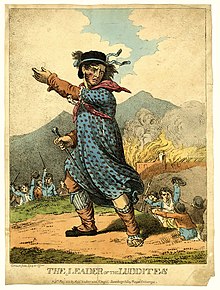
Back Luddisme Afrikaans لاضية Arabic Ludismu AST Ludçular Azerbaijani Лудити Bulgarian Luddisme Catalan Luddité Czech Ludiad Welsh Ludditter Danish Luddismus German

The Luddites were members of a 19th-century movement of English textile workers who opposed the use of certain types of automated machinery due to concerns regarding decreased pay for textile workers and a perceived reduction of output quality, and often destroyed the machines in organised raids.[1][2] Members of the group referred to themselves as Luddites, self-described followers of "Ned Ludd", a mythical weaver whose name was used as a pseudonym in threatening letters to mill owners and government officials.[3]
The Luddite movement began in Nottingham, England, and spread to the North West and Yorkshire between 1811 and 1816.[4] Mill and factory owners took to shooting protesters and eventually the movement was suppressed by legal and military force, which included execution and penal transportation of accused and convicted Luddites.[5]
Over time, the term has been used to refer to those opposed to industrialisation, automation, computerisation, or new technologies or even progress in general.[6]
- ^ Cite error: The named reference
Conniffwas invoked but never defined (see the help page). - ^ "Who were the Luddites?". History.com. Archived from the original on 20 December 2016. Retrieved 12 December 2016.
- ^ Binfield, Kevin (2004). "Foreword". Writings of the Luddites. Johns Hopkins University Press. pp. xiv. ISBN 1421416964.
- ^ Linton, David (Fall 1992). "The Luddites: How Did They Get That Bad Reputation?". Labor History. 33 (4): 529–537. doi:10.1080/00236569200890281. ISSN 0023-656X.
- ^ Cite error: The named reference
Trialswas invoked but never defined (see the help page). - ^ "Luddite"[dead link]. Compact Oxford English Dictionary at AskOxford.com. Accessed 22 February 2010.
© MMXXIII Rich X Search. We shall prevail. All rights reserved. Rich X Search